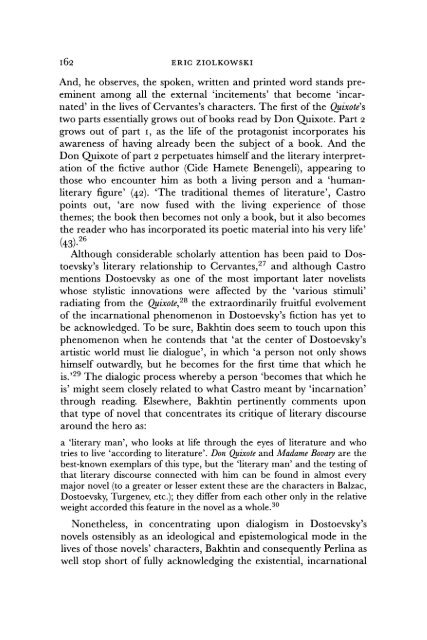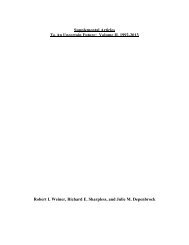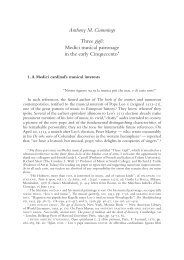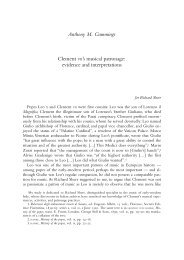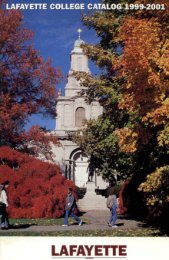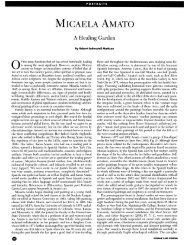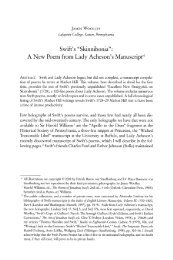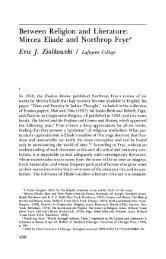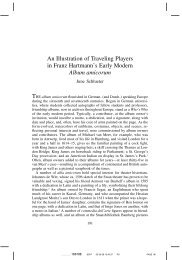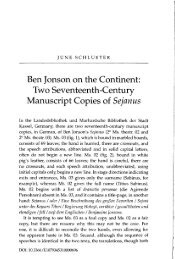Ziolkowski-Dost ... ianTradition-2001-p156.pdf
Ziolkowski-Dost ... ianTradition-2001-p156.pdf
Ziolkowski-Dost ... ianTradition-2001-p156.pdf
You also want an ePaper? Increase the reach of your titles
YUMPU automatically turns print PDFs into web optimized ePapers that Google loves.
l62<br />
ERIC ZIOLKOWSKI<br />
And, he observes, the spoken, written and printed word stands preeminent<br />
among all the external ‘incitements’ that become ‘incarnated’<br />
in the lives o f Cervantes’s characters. The first o f the Quixote’s<br />
two parts essentially grows out o f books read by D on Quixote. Part 2<br />
grows out o f part 1, as the life o f the protagonist incorporates his<br />
awareness o f having already been the subject o f a book. And the<br />
D on Quixote o f part 2 perpetuates himself and the literary interpretation<br />
o f the fictive author (Cide Hamete Benengeli), appearing to<br />
those who encounter him as both a living person and a ‘human-<br />
literary figure’ (42). ‘The traditional themes o f literature’, Castro<br />
points out, ‘are now fused with the living experience o f those<br />
themes; the book then becomes not only a book, but it also becomes<br />
the reader who has incorporated its poetic material into his very life’<br />
(43).•26<br />
Although considerable scholarly attention has been paid to <strong>Dost</strong>oevsky’s<br />
literary relationship to Cervantes,27 and although Castro<br />
mentions <strong>Dost</strong>oevsky as one o f the most important later novelists<br />
whose stylistic innovations were affected by the ‘various stimuli’<br />
radiating from the Quixote,28 the extraordinarily fruitful evolvement<br />
o f the incarnational phenomenon in <strong>Dost</strong>oevsky’s fiction has yet to<br />
be acknowledged. To be sure, Bakhtin does seem to touch upon this<br />
phenomenon when he contends that ‘at the center o f <strong>Dost</strong>oevsky’s<br />
artistic world must lie dialogue’, in which ‘a person not only shows<br />
himself outwardly, but he becomes for the first time that which he<br />
is.’29 The dialogic process whereby a person ‘becomes that which he<br />
is’ might seem closely related to what Castro meant by ‘incarnation’<br />
through reading. Elsewhere, Bakhtin pertinently comments upon<br />
that type o f novel that concentrates its critique o f literary discourse<br />
around the hero as:<br />
a ‘literary m an’, who looks at life through the eyes o f literature and who<br />
tries to live ‘according to literature’ . Don Quixote and Madame Bovary are the<br />
best-known exemplars o f this type, but the ‘literary m an’ and the testing o f<br />
that literary discourse connected with him can be found in almost every<br />
m ajor novel (to a greater or lesser extent these are the characters in Balzac,<br />
<strong>Dost</strong>oevsky, Turgenev, etc.); they differ from each other only in the relative<br />
weight accorded this feature in the novel as a w hole.30<br />
Nonetheless, in concentrating upon dialogism in <strong>Dost</strong>oevsky’s<br />
novels ostensibly as an ideological and epistemological mode in the<br />
lives o f those novels’ characters, Bakhtin and consequently Perlina as<br />
well stop short o f fully acknowledging the existential, incarnational


